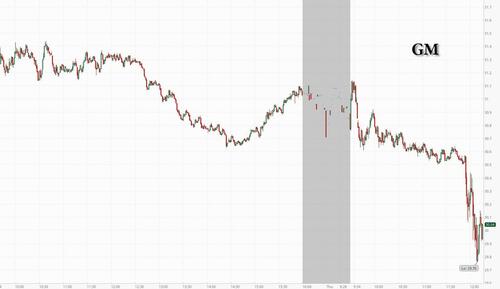If you have one of these vehicles, you might want to disable the air bag.
According to the report, the number of affected GM vehicles (a figure which has not yet been disclosed publicly) makes GM among the most exposed in a push by U.S. auto-safety regulators to recall 52 million air-bag inflators designed by Tennessee-based auto supplier ARC Automotive.
As noted previously, these inflators have been known to explode with too much force during a vehicle crash, sending metal shrapnel flying and hitting occupants in the face and neck with shards. At least two people have been killed, and several others injured in such incidents.
As if GM didn’t already have enough headaches between a crippling UAW strike, and playing catch up to Tesla in the EV war, moments ago it just got hammered again on a WSJ report the Detroit auto giant has at least 20 million vehicles built with a potentially dangerous air-bag part that the government says should be recalled before more people are hurt or killed.
According to the report, the number of affected GM vehicles (a figure which has not yet been disclosed publicly) makes GM among the most exposed in a push by U.S. auto-safety regulators to recall 52 million air-bag inflators designed by Tennessee-based auto supplier ARC Automotive.
As noted previously, these inflators have been known to explode with too much force during a vehicle crash, sending metal shrapnel flying and hitting occupants in the face and neck with shards. At least two people have been killed, and several others injured in such incidents.
The National Highway Traffic Safety Administration has yet to release how many vehicles overall would be covered by a recall, or which specific models would be impacted. The number of GM cars and trucks with these inflators could be higher depending on how regulators proceed.
NHTSA is holding a public meeting Thursday on its determination that the air-bag parts are defective and should be recalled. In April, the regulatory agency sent a letter to ARC, demanding it recall the inflators, which are essentially mini-exploding devices designed to rapidly inflate the air-bag cushion in a collision.
Remarkably, ARC has refused the regulatory request, resulting in NHTSA having to take the unusual step of scheduling a hearing, which is necessary if it wants to formally order a recall. The company will make a brief statement at the meeting, a lawyer for ARC said.
The auto supplier has said extensive field tests show no defect and the air-bag ruptures that have occurred are few and isolated. Aside from GM, there are 11 other automakers that have the ARC air-bag inflators covered by NHTSA’s action, including Ford Motor, Volkswagen, Toyota Motor and Hyundai Motor.
For those who haven’t watched a certain iconic movies, here is an artist’s rendering of how NHTSA is conducting its recall cost-benefit analysis.
Some of the known air-bag explosions have occurred in GM vehicles with one resulting in a fatality and others in injuries. GM so far has done five recalls over a span of six years on vehicles that have the ARC-made air bags. The latest one was earlier this year, when it recalled nearly one million Chevrolet and Buick SUVs, after a Michigan woman was injured in a crash in March.
The problem with the inflators, made over an 18-year period starting in 2000, lies in a blockage that can develop in a vent that is designed to release stored gas, regulators say.
The clog can cause too much pressure to build up, leading it to explode when it activates during a crash, regulators say.
NHTSA estimates that one out of every 370,000 air bag inflators deployed in the future will rupture.
“This will happen again,” said Sharon Yukevich, a NHTSA investigator who has led the agency’s probe into the inflators, at the Thursday public hearing. “The timing is unpredictable, and any one of the approximately 52 million subject inflators is at risk.”
“A recall of the entire subject population will address this risk,” she said.
GM has said it continues to investigate the issue with these air-bag parts and is trying to develop a fix for those that have been recalled already. In the meantime, owners can keep driving the affected vehicles, and it will ship necessary replacement parts when a remedy is ready, the company said.
NHTSA began investigating these faulty inflators more than eight years ago, after one person was injured and another one killed by metal pieces flung into the cabin by air-bag explosions. The incidents were similar to those involving air bags made by Takata, the Japanese supplier that was at the center of a roughly 42-million vehicle recall campaign that began last decade.
The Takata recall has cost automakers billions of dollars in repairs and has been difficult to fully address, involving many older models that have changed hands several times. Honda Motor was among the most exposed in that recall effort, having to fix about 13 million vehicles in the U.S. It set aside nearly $5 billion to cover the recall costs over a two-year period.
Needless to say, a 20 million car recall would be among the U.S.’s largest in history, something which the market is not too happy about and GM stock is understandably sliding on the news.
